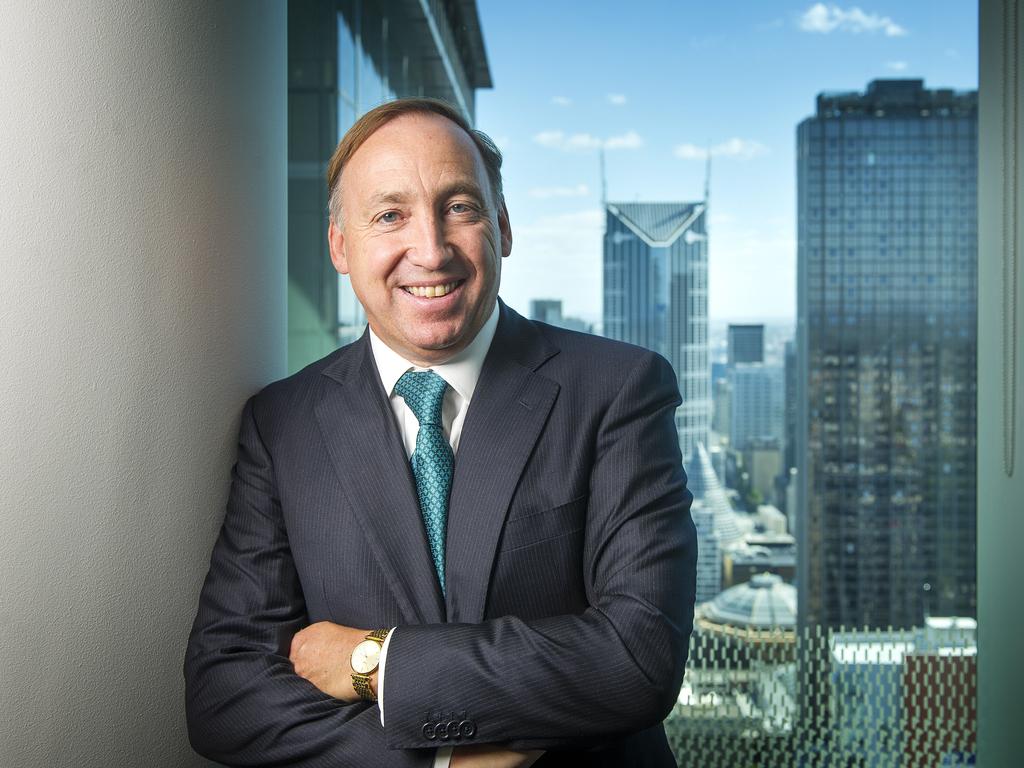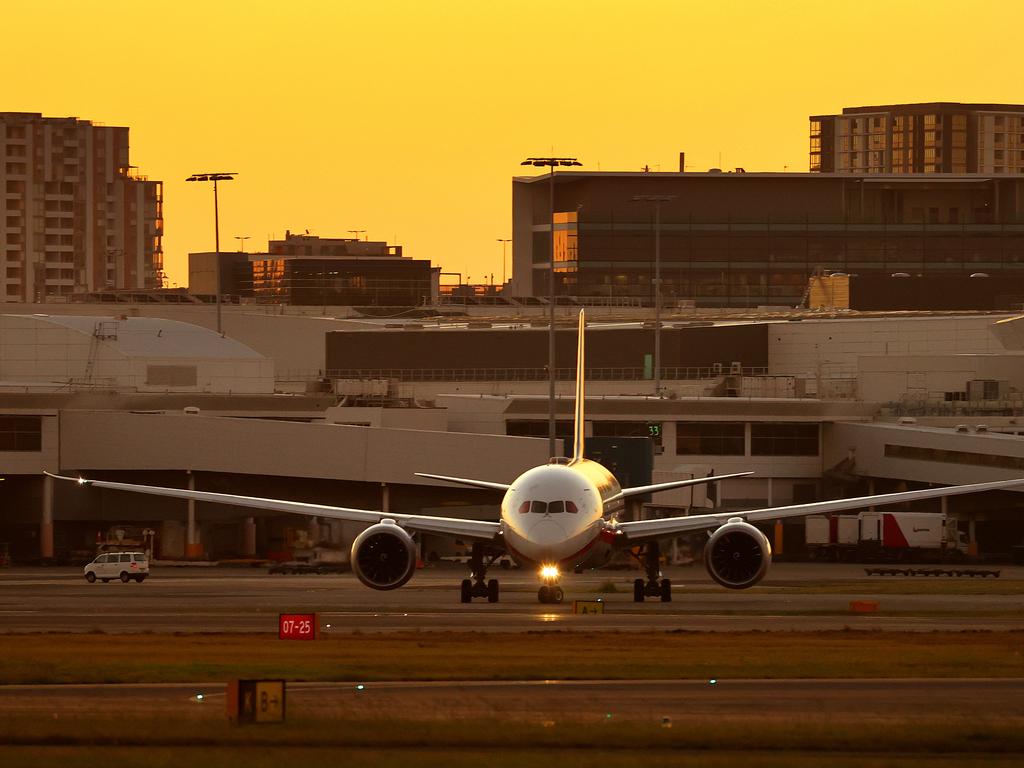Sydney Airport ready for takeoff as super funds pounce with $22.4bn bid
Australia’s largest gateway Sydney Airport has become the target of a $22.4bn takeover bid by a consortium of cashed-up super funds.

Australia’s largest gateway Sydney Airport has become the target of a $22.4bn takeover bid by a consortium of cashed-up super funds seeking to add the asset to their bulging infrastructure portfolio.
Calling itself “Sydney Aviation Alliance”, the four-member consortium approached the airport’s board last Friday with a conditional, non-binding offer of $8.25 a share.
The proposal was disclosed by Sydney Airport to the ASX on Monday, triggering a dramatic surge in the share price, which closed up 34 per cent at $7.78, a 17-month high, after reaching $8.00 during the session.
The appetite rubbed off on other travel and infrastructure stocks, with Auckland Airport lifting 5.5 per cent to $7.07 as investors reassessed the value of the sector’s historically cheap assets, which have been beaten down by the Covid-19 pandemic.
Although Sydney Airport advised shareholders to take no action on the proposal, the gateway’s biggest stakeholder, UniSuper, expressed some interest in the offer, which could prove critical to its success.
A condition of the proposal is that UniSuper must agree to reinvest its 15 per cent equity interest in a privatised Sydney Airport, rather than receive a cash consideration.
In a statement, the super fund said it was not a partner in the consortium and not privy to any details other than those publicly disclosed.
“UniSuper does, however, in principle, see merit in Sydney Airport being converted from a publicly listed company to an unlisted company. UniSuper also has a favourable view of the consortium partners,” said the statement. The partners include the IFM Australian Infrastructure and Global Infrastructure Funds, QSuper and New York-based Global Infrastructure Partners, which have in excess of $177bn of infrastructure funds under management worldwide, including interests in 20 airports.
A statement from the consortium said the proposal ensured “substantial ongoing Australian ownership of Sydney Airport”, pointing out the funds involved had a track record of investing billions of dollars in airports and other significant infrastructure assets.
“Australian airports in which consortium members have ownership interests have invested more than $3.8bn in capital programs over the last five years, including the construction of the second runway at Brisbane Airport and terminal improvements at Melbourne Airport,” said the statement. “These Australian airports have also provided more than $300m in rent relief to retail and property tenants due to the impact of Covid-19.”
The statement went on to say the consortium believed the proposal was in the long-term interests of Sydney and the travelling public, and would deliver significant value and economic certainty to Sydney Airport shareholders.

As well as UniSuper’s backing, the proposal was conditional on Sydney Airport providing due diligence, and the approval of the Foreign Investment Review Board and Australian Competition & Consumer Commission.
An ACCC spokeswoman said it would consider the acquisition once it received a submission.
Sydney Airport’s board, led by chairman David Gonski, took a measured approach to the bid, pointing out the indicative price was below the gateway’s pre-Covid-19 share price of $8.97. “The indicative proposal has been made during a global pandemic which has deeply affected the aviation industry and the Sydney Airport security price,” said a statement to the ASX.
“Securityholders do not need to take any action in relation to the proposal at this stage. There is no certainty that the proposal will result in a transaction.”
Financial services firm JPMorgan recently named Sydney Airport as its “least preferred” travel and infrastructure stock for the rest of 2021 due to its reliance on international borders reopening, and considerable rent relief paid to retailers.
In 2020, the airport slumped to a $145m loss, marking a half a billion dollar turnaround from 2019’s profit of $403m.
Passenger data for May showed numbers were down 80.2 per cent for the last year, with domestic travellers down 70 per cent, and international passenger numbers off by 96.2 per cent compared to the 12-months to May 2020.
Macquarie analysts said the indicative offer was “not necessarily generous” and cross and foreign ownership would be critical conditions of the bid.
IFM currently had stakes of 20 per cent in Brisbane Airport and 25 per cent in Melbourne, and would have to divest parts of those assets unless its interest in the Sydney Airport consortium was limited to 15 per cent, the analysts said in a client note.
“Alternative offers may be limited, as the major industry funds are tied into this offer, yet any new owner needs to maintain 51 per cent domestic ownership,” Macquarie’s note said.
Meanwhile, with Sydney Airport’s share registry heavily weighted towards pension and sovereign wealth funds, Bell Potter director of institutional sales and trading Richard Coppleson said a successful takeover could see $19bn in cash returned to shareholders who would most likely look to reinvest the funds into “other infrastructure” plays.
Travel stocks extended recent gains on Monday, with Qantas surging 2.7 per cent to $4.92, Flight Centre up 1.9 per cent to $15.75 and Webjet firming 1.8 per cent to $5.21.
Among infrastructure stocks, Transurban, APA and Spark Infrastructure were also up between 1.5 and 1.8 per cent.
The Sydney Airport play comes at a time when Australian super funds are flush with cash on the back of the sharemarket’s post-pandemic rebound, and looking for opportunities to deploy it. The Sydney Aviation Alliance conglomerate involves some of the largest super funds in the country with a broad portfolio of investment interests.
Owned by AustralianSuper, Cbus, Hesta and Hostplus, the IFM Australia Infrastructure Fund has sizeable investments in a range of critical assets including airports, seaports, electricity distribution and toll roads. A significant stakeholder in Melbourne, Brisbane and Darwin Airports, IFM AIF currently has more than $13bn in funds under management.
Consortium partner, IFM Global Infrastructure Fund, is an even bigger operation, managing $54bn in funds invested in assets around the world. These include the largest non-government stake in Manchester Airports Group, and the Flughafen Wien Group comprising Vienna, Malta and Kosice airports.
Global Infrastructure Partners manages $100bn for its investors.
Eclipsing them all however is QSuper, the Queensland-based superannuation fund specialising in managing the retirement funds for state public servants. With approximately $120bn in assets under management, QSuper has investments in Heathrow, Edinburgh and Brisbane Airports as well as the Port of Brisbane, NSW Ports and Lochard Energy. The fund is in the process of merging with SunSuper, creating a $200bn behemoth with 2 million members, making it the country’s largest after AustralianSuper.







To join the conversation, please log in. Don't have an account? Register
Join the conversation, you are commenting as Logout